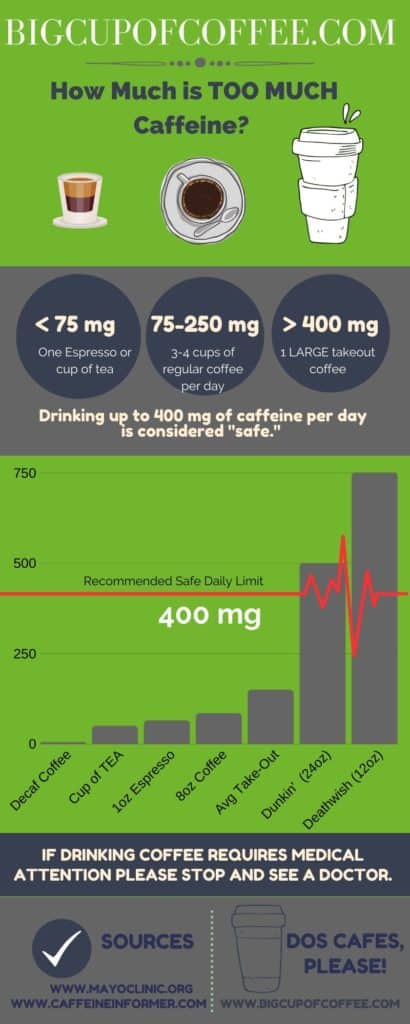18 Health Benefits of Coffee
Coffee is ubiquitous. It’s an understatement to call it simply popular. It’s a ritual. It’s routine. It’s a part of our identity. Need an energy boost for a hectic Monday? Want to stay awake to finish that term paper? Meeting some friends at the new corner cafe? Coffee will always be the first choice on the menu, whether it’s a house blend, a flat white, or something with whipped cream and sprinkles.
But are there any health benefits of coffee?
Or is coffee bad for you?
Since coffee is a part of the lives of billions of people, it has become a frequent subject in studies relating to various health outcomes. I want to help break it all down and finally answer the question below.
1. Coffee Helps You Live Longer and Healthier
Coffee is often associated with lowering the risk of premature death in men by 20% and women by 26% between the ages of 18 to 24 years old. Such claims are the findings of a 2008 study assessing the relationship between coffee consumption and mortality from cardiovascular disease, cancer, and other serious illnesses.
Other evidence that may prove coffee can make you live longer is the effect of coffee in people with Type 2 Diabetes. In a 20-year study, researchers concluded that coffee is beneficial to an individual with Diabetes Mellitus as it lowers the risk of death by 30%.
2. Contracting Heart Disease Is Less Likely Among Coffee Drinkers and Health Benefits May Include a Lower Risk of Stroke
People who report drinking 1 to 3 cups of coffee per day are less likely to be hospitalized for abnormal heart rhythms by 20% versus non-coffee drinkers. Even a 2012 study highly recommends drinking coffee in moderation as it can protect you from heart failure.
And if you’re thinking about your blood pressure when you drink coffee, worry not! A 2017 meta-analysis suggests that caffeine consumption is marginally beneficial for your blood pressure.
3. May Lower the Risk of Certain Types of Cancer
Carcinogens can increase the risk of cancer – the very reason why drinking coffee was assessed in 1991 for its carcinogenicity is the presence of acrylamide.
From the 1991 assessment, coffee was classified as “possibly carcinogenic to humans” based on the limited resources the scientists have gathered from the case studies concerning cancer of the urinary bladder.
In May 2016, a re-evaluation was made to determine the carcinogenicity of drinking coffee. Based on the latest assessment, WHO lifted coffee from its list of potentially carcinogenic foods. That’s because the scientists who convened for the International Agency for Research on Cancer Monographs Programme found that the carcinogenicity of drinking coffee is “unclassifiable”.
Aside from this, the committee for the 2015 Dietary Guidelines Advisory included coffee in the list and declared that the delicious beverage can be incorporated into a healthy diet provided that there is moderation (three to five cups a day) in coffee consumption.
As a matter of fact, coffee provides a cancer protection effect as it lowers the risk of liver cancer, colon cancer, endometrial cancer, and melanoma (a type of skin cancer.)

4. It Fights Depression and Makes You Happier
Depression is a serious medical illness that can negatively affect the quality of your life. It affects how you feel, the way you think, and how you act. If left untreated. It can lead to various emotional, behavioral, and physical problems.
This major depressive disorder is common in the US with 4.1% of Americans meeting the criteria for clinical depression. In a 2017 survey, depressive episodes are more prevalent in 8.7% of females than in males (5.3%).
Encouragingly, a 2011 Harvard study revealed the remarkable effect of coffee on depression. Based on the study, the risk of depression decreases as caffeine consumption increases.
In a 10-year follow-up study in which 208,424 individuals were observed, it was found that there’s a strong inverse association between coffee drinkers and the risk of suicide. From this study, researchers concluded that caffeine serves as a stimulant against suicide.
Thus, with frequent coffee drinking, both the risk of developing depression and suicidal tendencies are reduced.
5. Protects your Liver and Makes Liver Cancer Less Likely
A 2017 meta-analysis revealed that coffee can reduce the risk of developing liver cancer, cirrhosis, and nonalcoholic fatty liver disease.
A 2006 study revealed that drinking coffee at least 1 cup a day can lower the prevalence of high aspartate aminotransferase and alanine aminotransferase levels. Thus coffee drinkers are protected against cirrhosis, especially alcoholic cirrhosis.
A separate study conducted in 2007 found Coffee drinking protects the liver from injury and lowers the risk of liver cancer. When coffee consumption is increased to 2 cups per day, it lowers the risk of liver cancer by 43%.
6. May Lower the Risk of Parkinson’s Disease
Parkinson’s disease is a progressive brain disorder. As patients with Parkinson’s age, their symptoms become more apparent. These include difficulty walking and talking at the onset of the disease. The disorder becomes gradually more serious to the extent that a patient experiences mental and behavioral changes.
However, the risk of developing this disease can be lowered through frequent caffeine intake as described by a 2007 study published in Movement Disorders. The protective effect of caffeine is strongly supported by a 2018 study where a dramatic fivefold reduction in the risk of Parkinson’s disease was observed in persons who consume at least 4 cups of coffee every day.
Caffeine was also found as an effective treatment for Parkinson’s disease in terms of helping patients control their psychomotor movements. With regard to excessive somnolence, caffeine only provides an equivocal borderline improvement in Parkinson’s Disease.
Meanwhile, decaffeinated coffee studies still have no concrete evidence that can prove its beneficial association with this progressive brain disorder.
7. May Protect you from Alzheimer’s Disease and Dementia
Alzheimer’s disease falls under the umbrella of Dementia. This neurodegenerative disease greatly affects the memory, thinking, and behavior of a person as they get older. Although this disease doesn’t have a direct cure, its occurrence can be delayed.
Eating a healthy diet is one of the best-known modalities in delaying the onset of Alzheimer’s and coffee plays a vital part in lowering the risks of Alzheimer’s disease. In a 2010 follow-up study, researchers revealed that drinking 3 to 5 cups of coffee a day can delay the occurrence of AD by 65%.
The protective effect of caffeine against AD was identified in a similar study where a mouse was used as a model. The anti-inflammatory properties of the caffeine were responsible for the attenuation of cognitive impairments. These results were further supported by the Insititute for Scientific Information for Coffee (ISIC) with the claim that lifetime consumption of coffee reduces the risk of developing AD.
8. May Lower Risk of Type 2 Diabetes (Diabetes Mellitus)
Diabetes Mellitus is a metabolic disorder that prevents the body from utilizing the energy within the food consumed. With diabetes, the body experiences elevated blood sugar levels due to insulin resistance or reduced capability of the body to secrete insulin.
However, people with Diabetes can find relief from drinking coffee as it can decrease the risk of Diabetes Mellitus. According to a Singapore Chinese Health Study in 2008, increasing the amount of coffee intake can potentially lower the risk of type 2 diabetes in men and women.
The findings of the relationship between coffee consumption and type 2 diabetes are further supported by another clinical study in 2005. According to the systematic review, habitual coffee consumption can substantially lower the risk of diabetes type 2.
It was found that consuming 6 or more cups of coffee per day can lower the risk of diabetes type 2 by 22%. While drinking decaf coffee can decrease the risk by 6% for each cup of coffee consumed, according to Dr. Frank Hu.
9. Coffee is Rich in Essential Nutrients
While your favorite coffee may have undergone changes during the roasting process and even more from the decaffeination process, we cannot deny the fact that coffee beans contain many essential nutrients.
With just one single cup of your favorite joe, you can replenish your body with the following nutrients:
- 11% of Vitamin B2 (Riboflavin) Riboflavin is a water-soluble vitamin responsible for maintaining the energy supply in the body.
- 6% of Vitamin B5 (Pantothenic acid) It is a B vitamin that converts food into energy and is responsible for making cells.
- 3% of Manganese and Potassium Manganese plays a big role in the metabolism of nutrients in the body while Potassium regulates the fluid balance, the contraction of the muscles, and handling nerve signals.
- 2% of Vitamin B3 (Niacin) and Magnesium Niacin aids in lowering cholesterol, in easing arthritis pain, and boosting the brain functions. Magnesium, on the other hand, regulates the muscles throughout the body, including the heart.
10. Drastically Improves Your Physical Performance
Caffeine is also a stimulant that increases brain activity. Likewise, it stimulates your nervous system by sending signals to your fat cells to break down body fat, which is converted into energy needed by the body.
As caffeine increases the adrenaline levels (epinephrine) in the blood, it also decreases the amount of insulin sensitivity in the body. With the release of catecholamines, the body experiences physiological changes where heartbeat and breathing rate are regulated while the body is under emotional or physical stress.
While the body is in a “fight-or-flight response”, caffeine breaks down the body fat and uses the fatty acids as an energy fuel. Thus, when under physical stress you experience improvement in physical performance by 11 to 12%.
11. Helps you Burn Fat and May Promote Weight Loss
Caffeine is usually found in fat-burning supplements because of its natural properties that aid in burning fats in the body. Black coffee, for instance, is the most recommended beverage for those people who are practicing intermittent fasting. Likewise for those who wished to limit their caloric intake.
Other studies claim that caffeine is responsible for maintaining a fast metabolism in the body by 3 to 11%, which contributes to weight loss. While some studies view the metabolic rate on a case-by-case basis, lean people tend to lose weight by burning fat as much as 29% while obese individuals burn fat only at 10%.
The reason why coffee can help you burn fat is that it contains stimulants that can affect metabolism. These active substances aside from caffeine are:
- Theobromine: It is a mild stimulant also found in cocoa powder. It helps lower blood pressure, boost energy, and reduce water weight.
- Theophylline: A form of methylxanthine that aids in weight loss and depletion of fats.
- Chlorogenic acid: Chlorogenic acid or the CGA helps in regulating blood glucose concentration and lipid metabolism in the body.
12. May Boost Energy Levels and Make You Smarter
One of the reasons why people, especially college students, drink coffee is to help them stay awake, to boost their energy, and to improve their focus.
Coffee contains one of the most psychoactive substances in the world in the guise of caffeine. In a cup of brewed coffee (8 fl. oz), there’s at least 86 mg of caffeine. When you drink coffee, the caffeine goes into your bloodstream to your brain and blocks the inhibitory transmitter called adenosine that promotes sleep and relaxation.
Once the adenosine is blocked, the number of other neurotransmitters (such as norepinephrine and dopamine) in the brain increases. This leads to the enhanced production of neurons.
13. Helps in Pain Management
Extreme body workouts and other strenuous physical activity can result in body pain. Instead of taking ibuprofen to relieve the pain, drink coffee. In a 2006 study, it was revealed that coffee drinkers are less likely to experience post-workout pain by up to 48% when they drink at least two cups of coffee each day.
According to research, our bodies’ sensitivity to pain is triggered by:
- Sleep deprivation
- A reverse in exaggerated pain response due to restoration of normal sleep
- Stimulants or “wake-promoting agents”
A 2016 study also emphasized the role of coffee in pain management, where caffeine serves as an inhibitor blocker of adenosine receptors involved with nociception.
14. May Lower the Risk of Developing Multiple Sclerosis
Multiple Sclerosis is a neurodegenerative disease that disables the functionality of the brain and the central nervous system. It attacks myelin, a protective sheath that covers the nerve fibers which results in communication problems between the brain and the spinal cord.
At present, there are nearly 1 million cases of MS diagnosed in the United States over the age of 18, based on the prevalence study funded by the National MS Society. Though anyone can develop MS, the risk of developing Multiple Sclerosis can be prevented through regular consumption of coffee.
Based on a 2016 study published in the Journal of Neurology, Neurosurgery, and Psychiatry, high consumption of coffee (at least 4 cups a day) can decrease multiple sclerosis risk. The effectiveness of coffee and caffeine as a preventive measure against the development of MS and other neurodegenerative diseases can be supported by a 2018 study. The mechanisms behind its effectiveness are not completely understood.
15. May Prevent Retinal Degeneration
The chlorogenic acid found in every cup of coffee is responsible for the prevention of retinal damage in the eyes.
A 2014 Cornell University study revealed that CGA has a protective effect against the degeneration of the retina by reducing the apoptosis of hypoxia-induced retinal cells and preventing the Thy-1 down-regulation.
16. Black Coffee May Immunize Teeth from Cavities
If you want to keep your teeth cavity-free, the solution is to drink strong black coffee. That’s what Brazillian researchers highly suggest in their 2009 study. Be careful though, drinking coffee with additives like milk and sugar can cause cavities.
So although it may stain your teeth, strong black coffee can serve as an antibacterial and anti-carious to your pearly whites.
17. May Make Bones Stronger
Contrary to the old study that points out coffee as a bone calcium thief most recent studies reveal that coffee can increase the bone density of coffee drinkers. According to a 2019 Hong Kong Osteoporosis study, there are 12 serum metabolites – including 6 caffeine metabolites – that are associated with bone mineral density.
The beneficial effects of coffee on our bones were also observed in a 2018 longitudinal study. According to Taiwanese researchers, coffee can reduce the risk of osteoporosis in men and premenopausal women who have medium to high coffee drinking habits.
18. Coffee May Lower Risk of Gout
Gout is the inflammation of the joints in the body due to the build-up of too much uric acid. These acids are created when chemical compounds like purine are broken down. With the occurrence of the condition called hyperuricemia, the uric crystals are deposited in the joints which causes painful swelling and inflammation of the joints.
Yet, the risk of gout can be lowered with the consumption of coffee. That’s because coffee contains bioactive micronutrients such as:
- caffeine
- diterpenes
- chlorogenic acid
- trigonelline
Uric acid levels that cause inflammatory arthritis can also be lowered by increasing the rate of excreting uric acid – where coffee competes with the enzymes that break down the purines in the body. By drinking coffee at least 5 cups a day, uric acid levels can be reduced.
References
As you can see above, there are a lot of coffee benefits in every cup, so coffee drinkers can rest assured that they are safe maintaining their coffee-drinking habits.
Want more information? Here are some more resources to help you discover the health benefits of coffee:
- Coffee and Your Health
- Drink Up: UAH Nursing Professor Explains the Health Benefits of Coffee
- Longevity Benefits Seen With Moderate Coffee-Drinking
- Coffee’s Health Benefits
- Health Benefits of Coffee
- New Research Into Health Benefits of Coffee
- Kansas State University: The Health Benefits of Coffee
- Caffeine Has Positive Effect on Memory, Johns Hopkins Researchers Say
- Nutrition News: Weighing the Health Benefits of Coffee
- A Cup of Coffee With That Memory Test?
- Coffee, the New Health Food
How does coffee contribute to your daily activities? What coffee do you prefer most? Does drinking coffee affect you positively or negatively? Please share your answers in the comments below.








Tom’s point about coffee potentially lowering the risk of Type 2 Diabetes caught my eye since my family has a history of it. Can anyone clarify if all types of coffee, including those with creams and sugars, have the same effect? Or are we talking exclusively about black coffee here? Would love to understand the specifics a bit better.
I’ve always wondered, does roasting level affect the health benefits of coffee? I’m curious whether light, medium, or dark roasts have different impacts on the health benefits mentioned, such as the reduced risk of diabetes or protection against liver disease.
As an avid coffee drinker and a nutritionist, I have to commend Tom for highlighting the multifaceted health benefits of coffee, especially in regards to its contribution to longevity and potential protection against Type 2 Diabetes. However, I do need to stress the importance of consuming coffee in moderation, as excessive intake can have opposite effects, particularly in populations with specific health conditions. It’s great to see articles like this shed positive light on our favorite brew.
Ever since I started drinking coffee in my college years, I’ve always felt more alert and focused. This article just confirms that my morning cup does more than just wake me up. I’ve actually experienced improved physical performance during my workouts, which I now know could be attributed to my coffee consumption. I completely agree with the article, there’s so much more to coffee than just the caffeine rush.